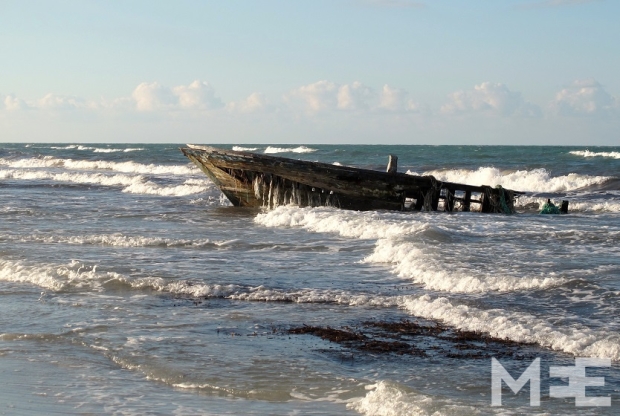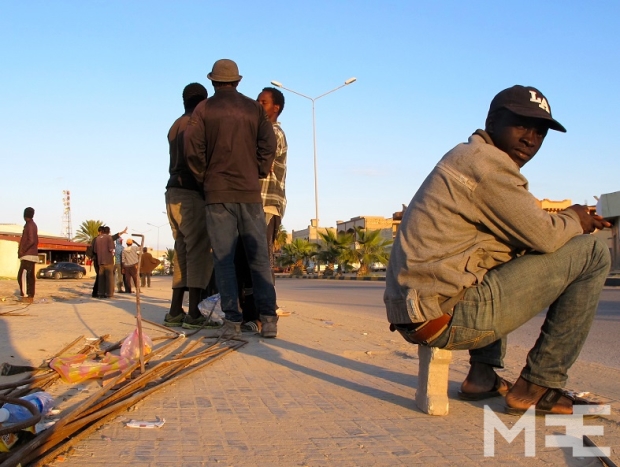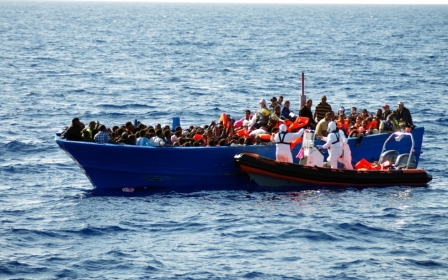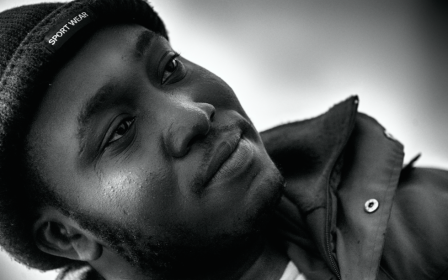Libya's Dark Knights: Vigilantes take on the people-smugglers
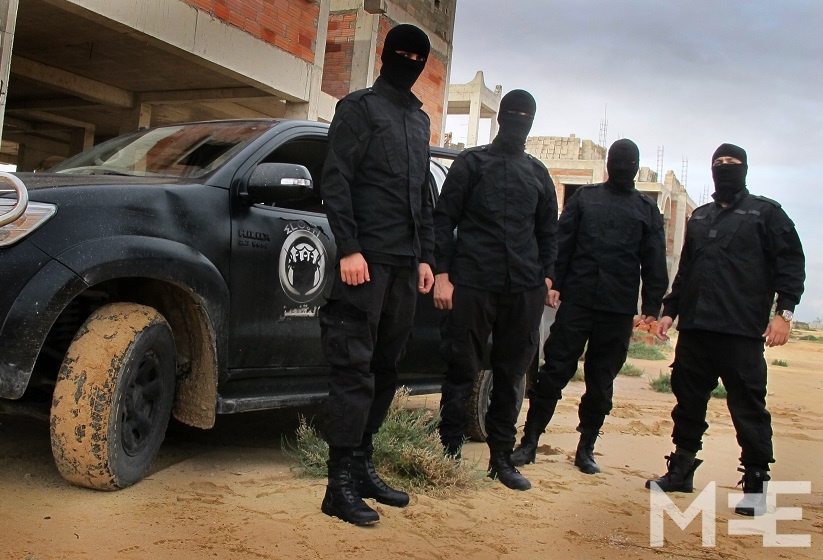
ZUWARA, Libya – The sight of masked men inside black pick-up trucks would be inherently distressing in most places around the world, but this image brings a sense of reassurance to the residents of Zuwara, Libya's northernmost city.
The group, known as the “the Masked Men”, denies it is a militia and insists there is no religious or political agenda, rather it plans to instil a sense of law and order in a part of Libya that has been ravaged by smuggling rings and criminal gangs in recent months.
While the once sleepy coastal town of Zuwara had become a major departure point for migrants on their way to Italy, the town's 60,000 residents were not prepared for the tragic sight that greeted them on the 27 August - white sandy beaches littered with nearly 200 corpses after an old wooden boat capsized a few miles off the coast, killing almost half of the passengers on board.
The Zuwaris dug a mass grave, and marched from the town square to the port to demand action.
“Zuwara cannot be a home for murderers,” they chanted in their local Amazigh language.
It wasn't the first time townspeople had demonstrated against the smugglers, but the scale of the last tragedy led them to demand that this would be the last.
Despite the group’s insistence on privacy, Middle East Eye was able to negotiate an interview with Ayman al-Kafaz, the Masked Men’s commander-in-chief.
Kafaz told MEE that the group was originally set up in January 2013 as the “Special Intervention Squad” aimed at tackling any criminal activity, but that the movement had expanded rapidly over the last two years. Today the Masked Men say they have 130 able-bodied recruits – half of whom are policemen - working in 24-hour shifts.
The group is officially registered in Tripoli's Ministry of Interior, and that's where, according to Kafaz, the salaries for the Masked Men are paid.
Since the 2011 overthrow of long-time strongman Muammar Gaddafi, the security situation has deteriorated sharply in Libya. Warring militias now control vast chunks of the country, with two rival parliaments, Tripoli and Tobruk, vying for power, and the Islamic State group rising up amidst the chaos.
“The rule of law has vanished in Libya but it's still in force in Zuwara,” Kafaz said.
The commander recalled that since the August incident, the Masked Men have arrested over 35 people with alleged links to human-trafficking. While MEE could not verify if these men were still locked up and could not inspect the conditions they were being kept in, residents insist that life has become much better since the crackdown.
Kafaz admitted the situation is far from perfect but he labelled Europe's measures – which have involved trying to stop smuggling ships once they leave Libya - to tackle the migrants as “totally useless”.
“If Brussels really wants to stop the flow of people it should empower local authorities on the southern shore of the Mediterranean as well as organisations such as ours. This is the last gateway [before Europe] and we're able to control it if we receive enough support,” Kafaz added.
Civil servants like Sadiq Jiash, who works as a local council official, largely support the arrival of the Masked Men.
“There's no functional government in the country and we realised that we needed to do something to cope with the growing crisis in our territory,” he told MEE.
Jiash is a civil servant and president of Zuwara's Emergency Committee, an organisation set up in April 2014 and run by 35 local volunteers, including doctors, firefighters and members of the local Red Crescent amongst others.
“In the case of the migrants, we look for the corpses and aid in the rescue attempts in full coordination with the local administration, the civil society and the Masked Men,” Jiash said, while insisting that he was “highly satisfied” with the degree of collaboration between all the sides.
Turning the tide
The growing chaos has allowed smugglers to thrive in Libya and many in Zuwara had been growing rich on the illicit trade for years.
So far this year, more than 140,000 people have set off to Italy from Libya and Tunisia, with a significant proportion of people coming through Zuwara. Almost 3,000 people have died trying to make the journey. On Thursday, Italian navy rescue boats pulled 1,500 migrants from the sea off the coast of Libya in just a few hours.
“Gaddafi had the key to control the flux of migrants and eventually used them to put the pressure on the EU. But everything went out of control after the war [in 2011],” Jiash said.
Following Gaddafi's removal, lawlessness set in. While the town has attempted to control the situation by arresting alleged troublemakers, Zuwara does not have a prison.
“We organised ourselves to arrest the smugglers and transfer them to Sabrata or Zawiya – two neighbouring locations,” said Jiash. “But they were soon back in business. Corruption in Libya is rife, you know?”
After the catastrophe on the beach though, and with the prospect of EU military action and possible air strikes to take out smuggling networks, residents decided they could stay silent no more.
When 10 days after the boat capsized, the Masked Men appeared on the scene, residents were desperate for change. The group’s first act was to reportedly arrest about a dozen people deemed to have links with smuggling networks. Instead of sending them elsewhere, they just created a makeshift prison in Zuwara.
Coping with chaos
The solution is far from ideal - but there are few alternatives. Today the road that connects Zuwara with Tripoli remains blocked most of the time due to periodic clashes that break out between rival militias on the coastal way. The same applies to the less-travelled road south to the Nafusa Mountains, Libya's main Amazigh stronghold.
From the town's Red Crescent offices, Ibrahim Atushi, head of the NGO's local emergency committee, blamed the country's split between two rival centres of power for the shortage of medicines and other basic supplies. While one government operates from Tripoli, another is seated some 1,000 kilometres east in Tobruk.
“The roads are blocked so we can hardly cater for the local population and the 3,000 registered foreign workers among us, [who] mostly [are] Sub-Saharans,” Atushi told MEE.
Other than providing medical assistance to locals, the Red Crescent has been overstretched trying to tackle the migrant and refugee crisis.
“We have to register the corpses and conduct DNA tests. We also take pictures of the clothes to find clues on the whereabouts of the missing,” Atushi said.
However, he also pointed out that the number of bodies has diminished “drastically” over the last few months thanks to the Masked Men and the work of civil society.
“We cooperate with them [the Masked Men] and they call us every time they find migrants. They're a group of well-educated local men, many of which even have university degrees,” said Atushi.
Cul-de-sac
Although controversial, the crackdown on Zuwara's trafficking network has apparently proved effective. In October, MEE was able to spend time on board Dignity One, one of the Doctors Without Borders vessels rescuing migrants and refugees in the Mediterranean.
The organisation reports that the majority of the rescue efforts in recent months have taken place near Tripoli rather than Zuwara, indicating that fewer migrants are setting off from there.
The number of boats departing from Zuwara had been “significantly lower” over the last few months, Dignity One project coordinator Juan Matias said.
Migrants who spoke to MEE said that Zuwara is no longer known as a key departure point for Europe, but rather a cul-de-sac.
But not everyone is happy about the development. Amiri, a 23-year-old from Nigeria, told MEE he left his village almost two years ago and had only just gathered the $500 to jump on a raft to Europe.
“I only came to Zuwara because someone told me it was a much safer place to stay until I left,” he said.
Now he’s stuck. Amiri says he may brave Libya’s perilous roads to travel to another more lawless part of Libya where smugglers continue to work out in the open, militias hunt down and arbitrarily detain migrants for ransom, and police officers beat and arrest them. But at least here he says he may have a greater shot of finally reaching a better life in Europe, and for many others like him it’s a risk worth taking.
New MEE newsletter: Jerusalem Dispatch
Sign up to get the latest insights and analysis on Israel-Palestine, alongside Turkey Unpacked and other MEE newsletters
Middle East Eye delivers independent and unrivalled coverage and analysis of the Middle East, North Africa and beyond. To learn more about republishing this content and the associated fees, please fill out this form. More about MEE can be found here.


